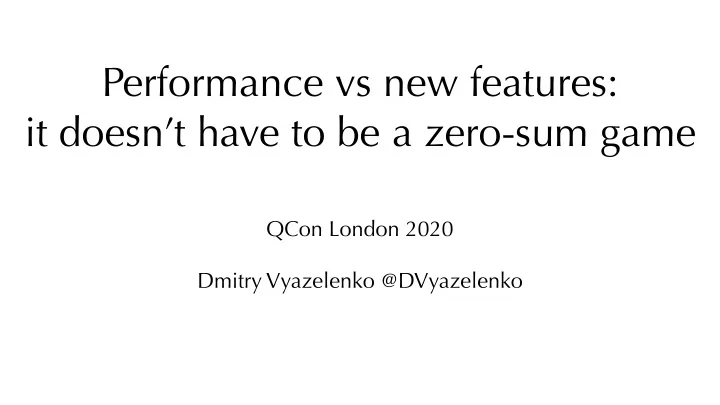

Performance vs new features: it doesn’t have to be a zero-sum game QCon London 2020 Dmitry Vyazelenko @DVyazelenko
Do you trust your file system?
Do you trust your file system? All File Systems are Not Created Equal: On the Complexity of Crafting Crash Consistent Applications Pillai et al. 2014
Do you trust your file system? Table 1: Persistence Properties
Do you trust your file system? Table 2: Failure Consequences
Do you trust your file system? Redundancy does not imply fault tolerance: analysis of distributed storage reactions to single errors and corruptions Ganesan et al., FAST 2017
Do you trust your file system? We studied eight widely used distributed storage systems: Redis, ZooKeeper, Cassandra, Kafka, RethinkDB, MongoDB, LogCabin, and CockroachDB. We find that these systems can silently return corrupted data to users, lose data, propagate corrupted data to intact replicas become unavailable, or return an unexpected error on queries.
“Don't use ZFS. It's that simple. It was always more of a buzzword than anything else, I feel, and the licensing issues just make it a non-starter for me.” – Linus Torvalds https://www.realworldtech.com/forum/?threadid=189711&curpostid=189841
CRC A cyclic redundancy check ( CRC ) is an error-detecting code commonly used in digital networks and storage devices to detect accidental changes to raw data. Blocks of data entering these systems get a short check value attached, based on the remainder of a polynomial division of their contents.
CRC in Java 8
CRC in Java 8 package java.util.zip; public interface Checksum { public void update( int b); public void update( byte [] b, int off, int len); public long getValue(); public void reset(); }
CRC in Java 8 public class CRC32 implements Checksum { /** * … * Upon return, the buffer's position will * be updated to its limit; its limit will not have been * changed. * * @param buffer the ByteBuffer to update the checksum with * @since 1.8 �*0 public void update(ByteBuffer buffer) }
CRC in Java 14 public interface Checksum { public void update( int b); default public void update( byte [] b) �/0 @since 9 public void update( byte [] b, int off, int len); default public void update(ByteBuffer buffer) �/0 @since 9 public long getValue(); public void reset(); }
CRC in Java 8
CRC in Java 8 final ByteBuffer buffer = ��../ ; final int position = buffer.position(); final CRC32 checksum = new CRC32(); checksum.update(buffer); final int checksum = ( int )checksum.getValue(); buffer.position(position);
CRC in Java 8 final ByteBuffer buffer = ��../ ; final int position = buffer.position(); 😮 final CRC32 checksum = new CRC32(); checksum.update(buffer); final int checksum = ( int )checksum.getValue(); buffer.position(position);
How about… public static int crc32( int crc, ByteBuffer buffer, int offset, int length)
How about… public static int crc32( int crc, ByteBuffer buffer, int offset, int length) public static int crc32( int crc, long address, int offset, int length)
Digging deeper public class CRC32 implements Checksum { private native static int update( int crc, int b); private native static int updateBytes( int crc, byte [] b, int off, int len); private native static int updateByteBuffer( int adler, long addr, int off, int len); }
Digging deeper public final class CRC32C implements Checksum { @HotSpotIntrinsicCandidate private static int updateBytes( int crc, byte [] b, int off, int end) @HotSpotIntrinsicCandidate private static int updateDirectByteBuffer( int crc, long address, int off, int end) }
Baseline JDK 8 (1.8.0_242-b20) 40 40 35 35 Millions of msg/sec 30 25 20 15 10 5 0 Record Replay
Baseline JDK 11 (11.0.6+10-LTS) 40 41 35 Millions of msg/sec 30 25 25 20 15 10 5 0 Record Replay
Initial CRC support JDK 8 (1.8.0_242-b20) 40 40 35 Millions of msg/sec 34 30 25 25 20 21 15 10 5 0 Record Record (CRC-32) Replay Replay (CRC-32)
Initial CRC support JDK 11 (11.0.6+10-LTS) 40 41 35 Millions of msg/sec 30 28 25 26 24 20 21 17 15 10 5 0 Record Record (CRC-32) Record (CRC-32C) Replay Replay (CRC-32) Replay (CRC-32C)
CRC-32 vs CRC-32C CRC-32 CRC-32C 180 160 Execution time, ns 140 120 100 80 60 40 20 32 64 128 256 512 1024 2048 4096 Input size in bytes
CRC-32 vs CRC-32C CRC-32 CRC-32C 10000 Slicing by 8 Execution time, ns 1000 100 10 32 64 128 256 512 1024 2048 4096 Input size in bytes
CRC-32 vs CRC-32C CRC-32 CRC-32C 10000 Slicing by 8 Execution time, ns 1000 100 10 32 64 128 256 512 1024 2048 4096 Input size in bytes
How replay works final int bytesRead = readRecording(); while (hasMoreFrames(bytesRead)) { final int frameLength = readFrame(); verifyChecksum(); if (publication.tryClaim(frameLength, bufferClaim)) { bufferClaim.putBytes(replayBuffer, offset, frameLength) .commit(); } }
Let’s fix replay #1 final int bytesRead = readRecording(); while (hasMoreFrames(bytesRead)) { final int frameLength = readFrame(); verifyChecksum(); handleStartOfBatch(); if (publication.tryClaim(frameLength, endClaim)) { endClaim.putBytes(replayBuffer, offset, frameLength) .commit(); } handleEndOfBatch(); }
Let’s fix replay #1 JDK 11 (11.0.6+10-LTS) 27 25 26 Millions of msg/sec 22 20 21 15 10 5 0 Replay Replay (CRC-32C) Fix#1 Fix#1 (CRC-32C)
Let’s fix replay #2 final int bytesRead = readRecording(); while (hasMoreFrames(bytesRead)) { readFrame(); verifyChecksum(); prepareFrame(); } publication.offerBlock(replayBuffer, 0, endOfLastFrame);
Let’s fix replay #2 JDK 8 (1.8.0_242-b20) 49 45 Millions of msg/sec 40 40 35 30 30 25 25 20 15 10 5 0 Record Record (CRC-32) Replay Replay (CRC-32)
Let’s fix replay #2 JDK 11 (11.0.6+10-LTS) 49 45 Millions of msg/sec 40 41 39 35 30 28 25 20 15 10 5 0 Record Record (CRC-32C) Replay Replay (CRC-32C)
Conclusions • Performance vs new features: it doesn’t have to be a zero-sum game • Stay curious and keep on digging…
Recommend
More recommend